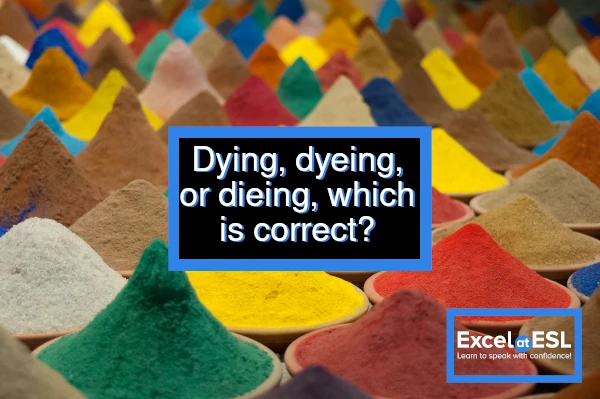Dying, dyeing, and dieing are all types of homophones. Homophones are words which sound the same. They may look different, or they may not. There are quite a few of these in English that you might be familiar with. However, today, let’s explore a set of words which might cause you trouble due to their similarity.
Dying, dyeing, and dieing are three different words. They can all be correct in the proper circumstances. However, dieing is most often a misspelling of dying. Take care to understand their meanings and uses.
Homophones
Before we begin our discussion of our word set, let’s briefly discuss ‘homophony’. Explained simply, homophones are words that sound the same and ‘homophony’ is the adjective used to describe this phenomenon. Due to the finite number of speech sounds in language, it’s unavoidable that some words are going to have the same pronunciation. All languages on Earth have some degree of homophony depending on the number of speech sounds available to them. If you want a deeper discussion on English speech sounds and how they can help your pronunciation, check out my article “How to Sound like a Native English Speaker.”
You may already know all of this and the concept is very simple. However, this phenomenon is more complex than you may realize. Homophones can be further broken down into subcategories such as, homonyms, homographs, heterographs, and heteronyms.
To understand the meanings of these words, you can break them down into their vocabulary elements. We have four vocabulary elements in the words above: homo-, hetero-, -graph, and -nym. They all have simple meanings that you can use to piece together the complete meanings of these words.
- homo- = the same
- hetero- = different
- -graph = writing
- -nym = name
So, piecing together our vocabulary elements, we find that homonym means “the same name”; homographs means “the same writing”; heterograph means “different writing”; and heteronym means “different name”. If you want to learn more about understanding the meaning of unknown words using vocabulary elements, check out my article “How Do You Read Difficult Words in English?”
Homonyms (the same name)
These are words that have the same spelling and the same pronunciation, but have a different meaning. Examples of this include:
- tire (wheel of a car) and tire (become fatigued)
- bat (a flying mammal) and bat (a long wooden stick used in baseball)
- stalk (the stem of a plant) and stalk (to follow and harass someone)
- left (past tense of leave) and left (opposite of right)
Heteronyms (different names)
This is a sort of antonym of homonym. These are words that have the same spelling, but a different pronunciation and meaning. Examples of this include:
- desert (to leave behind) and desert (a large sandy area)
- tear (to rip) and tear (a drop of liquid from the eye)
- record (to make a copy of sound) and record (a vinyl musical disc)
- produce (to create something) and produce (fruits and vegetables)
Homographs (the same writing)
These are words that are spelt the same and have a different meaning. The pronunciation does not matter. Examples include:
- bow (to bend at the waist) and bow (a ranged weapon)
- bark (the sound a dog makes) and bark (the rough skin of a tree)
- stock (to put items up for sale) and stock (the shares of a public company)
- host (the presenter of a TV program) and host (to welcome someone into your home)
Heterographs (different writing)
This is the opposite of the homograph. Heterographs have the same pronunciations, but the meanings and spellings are different. Examples include:
- to, too, two
- there, their, they’re
- bow (to bend at the waist) and bough (the branch of a tree)
- rain (water that falls from the sky) and reign (to rule as a monarch)
Dying, Dyeing, and Dieing
Based off our discussion above, we now know that these three words are all heterographs. They all have the same pronunciation, but the spellings and meanings of them are all different. So, let’s take a look at what those meanings are.
What does Dying Mean?
This is the present participle or gerund (a gerund is a verb used as a noun) of the verb “to die”. It means to cease living.
- The men are dying of thirst in the desert.
- Plants start dying in the fall.
- The man was dying of cancer.
Dying can also be used as a gerund or adjective in sentences.
- I’ll protect you until my dying breath.
- The dying tree looks sick.
There are also alternative ways to use the word “dying” that don’t have a literal sense.
- I’m dying to visit Rome.
- The comedian had us dying of laughter.
- I’m dying to drink some water. (extremely thirsty, not literally dying)
What does Dyeing Mean?
This is the present participle or gerund of the verb “to dye”. It means to change the colour of something (e.g. fabric or hair) using a natural or chemical substance.
- I love dyeing t-shirts rainbow colours.
- She’s dyeing her hair right now.
- We are dyeing the snow to make a colourful snowman.
What does Dieing Mean?
This word is most often a misspelling of dying. However, it can also be considered a specialized industrial term for casting metal. It’s important to note that this is a very rare term that isn’t used often outside of special circumstances.
It can be used as the present participle or gerund of the verb “to die” (not the same as the verb above). A die is a mould used to make industrial parts or toys. A molten material (most often metal or plastic) is poured into a device that outlines the shape of the final product and left to cool down.
- The workers were dieing steel plates.
- They are dieing car parts using the industrial die.
Conclusion
Overall, your choice of words is going to depend on what you want to say. The important thing to remember is that all three of these words may sound identical, but their spellings and meanings are different.
You likely won’t need to use dieing unless you work in a metal factory or work as an engineer creating special parts. So, you don’t need to worry too much about remembering the usage for this word. Just don’t mistake dieing as the present participle of “to die”!
Dyeing and dying may be tricky, but all you need to remember is that dyeing is closely linked to dye. These words are associated with colour and vibrancy. This is the opposite of dying and to die. These words are the opposite of vibrant. They are the cessation of life. You can think of dyeing and dying in this way to help you remember their uses.



